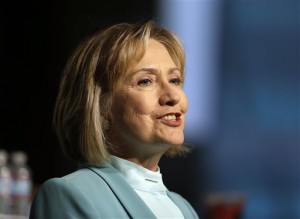2016 US presidential race off to an early start
WASHINGTON — The next US presidential election is more than two years away, but competition for the nomination is well under way. Democrats have a powerful frontrunner who may not face a real challenger, while Republicans have a wide-open field with no candidate close to being a favorite.
The race is taking place against the backdrop of congressional elections this November, in which Republicans are expected to keep their significant majority in the House of Representatives and perhaps gain a majority in the Senate.
Republican domination of both houses of Congress for the last two years of President Barack Obama’s second term would play heavily on the 2016 presidential race and would leave Obama with only his veto pen to protect his legislative achievements so far — the sweeping health care overhaul, for example. Republicans would be sure to try to push through legislation that revokes the law.
Right now, the Democratic nomination would appear to be Hillary Rodham Clinton’s for the taking. The 2008 presidential candidate who lost the nomination to Obama is a former first lady, senator and secretary of state. She has a big lead in the early polling and vast financial backing coming together, even though she remains coy about her plans. As she travels the country making speeches, a super political action committee is urging her to announce her candidacy and reports it has already raised $1.7 million in the first three months of the year.
Waiting for her to decide is Vice President Joe Biden, who has said he sees “no obvious reason” he shouldn’t make a run. So are Maryland Gov. Martin O’Malley and New York Gov. Andrew Cuomo. The left wing of the party is urging Massachusetts Sen. Elizabeth Warren to make a run. She’s a favorite of the liberals because of her populist attacks on America’s big financial institutions and vocal criticism of growing income inequality.
Article continues after this advertisementThe Republican field is much wider. It includes Jeb Bush, the former Florida governor, brother to President George W. Bush and son of President George H.W. Bush. New Jersey Gov. Chris Christie was an early favorite but was brought low by a political scandal over the closure of lanes leading to a major bridge into New York City and days of horrendous traffic jams.
Article continues after this advertisement“That’s one of the reasons that Jeb Bush has had so much buzz early on, because there are some pretty strong indications that some of the top donors … once they soured on Christie, are beginning to test the waters to see if Bush is interested in a run,” said Texas Christian University political scientist Adam Schiffer. “It’s just buzz, speculation at this point. But the maneuvering by the top donors and senior party officials and office-holders are much more indicative of what may happen than the polls or grass-roots buzz or anything like that.”
Farther to the right, conservative favorites are Texas Sen. Ted Cruz, who was largely responsible for the government shutdown late last year, and Kentucky Sen. Rand Paul, son of former Texas Rep. Ron Paul, who made a libertarian run in the 2012 Republican primaries. Wisconsin Rep. Paul Ryan, who is determined to slash federal spending for social safety net programs, finds backing in more centrist Republicans, as does Wisconsin Gov. Scott Walker, who has diminished the power of unions representing state workers.
Texas Gov. Rick Perry, who ran in 2012 but fell from favor after an embarrassing mistake during a Republican debate, wants to have a second chance at the nomination. Florida Sen. Marco Rubio, a Cuban-American, is in the running and could help Republicans pull the Hispanic vote, which went heavily for Obama in 2012. Former Pennsylvania Sen. Rick Santorum, who failed to gain the nomination in 2012, is talking about a new attempt.
The problem for both parties, the Republicans in particular, is the U.S. primary nominating process. Each party in all the states holds a primary election or a caucus to determine its favorite. But that process is dominated by the extreme voters. That was part of the problem that doomed former Massachusetts Gov. Mitt Romney in his 2012 campaign against Obama. In order to gain the nomination, he had to adopt positions that were too far right to appeal to Republican moderates and independent voters.
If the Democrats pick Clinton, they will be “pretty solidly united behind her. The Republicans are going to have to assume they’re not going to pick off any Democrats and will have to pick up a majority of independents to be even competitive,” said James Broussard, a historian at Lebanon Valley College in Pennsylvania. “The question is, how do you do that? And obviously, the answer is for a guy like Christie or Bush to present as conservative a face as you can to the base, but you do it in a way that doesn’t scare away the moderates and independents — just the way [former President Ronald] Reagan did.”
RELATED STORIES
Jeb Bush remarks expose GOP vexed by immigration
